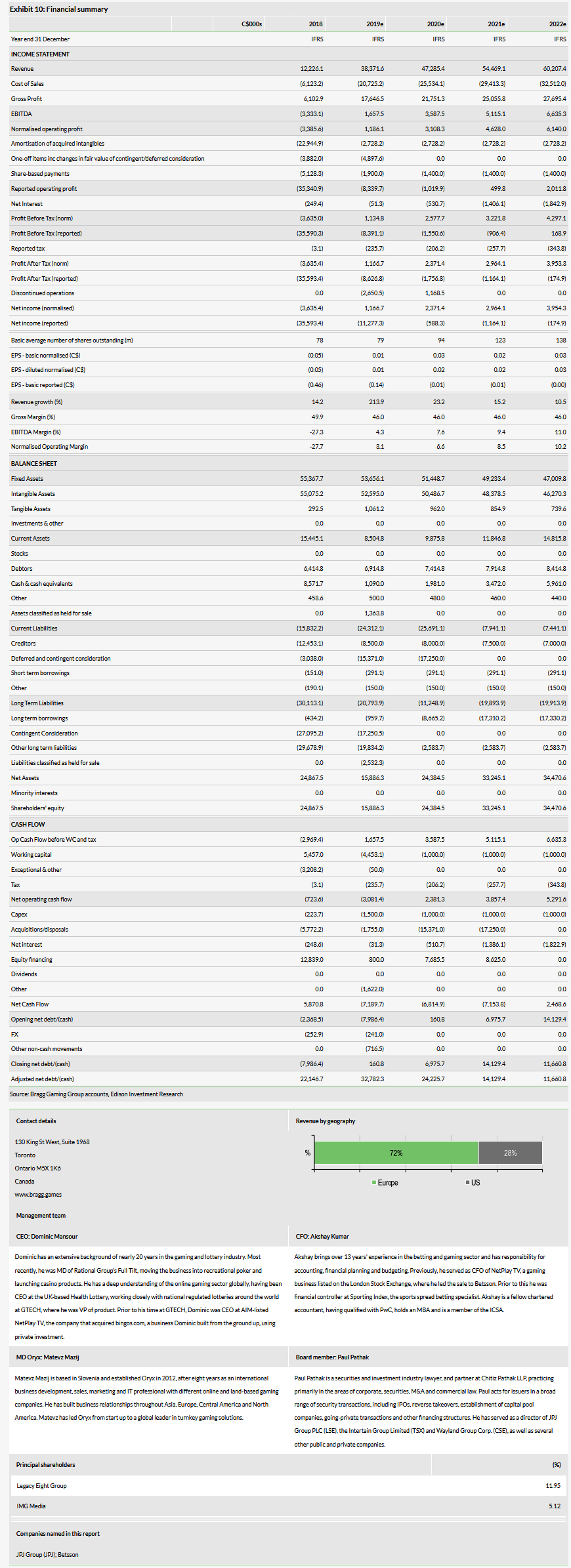Bragg Gaming Group Inc (TSXV:BRAG) core asset is Oryx Gaming, a fast-growing online B2B gaming solution provider. We forecast C$38.4m revenues in FY19, with continued double-digit revenue growth until FY22. The underlying Oryx business is cash generative and we estimate that group EBITDA margin will expand from break-even at H119 to 7.6% next year. Investment risk is high, largely due to the need for financing, but Bragg is strategically well-positioned to make accretive M&A. Key milestones will be the development of positive cash flow, as well as the successful payment of the C$32.6m contingent cash consideration for Oryx. Bragg is still an early-stage business and trades at 15.3x EV/EBITDA and 11.2x P/E for FY20e.
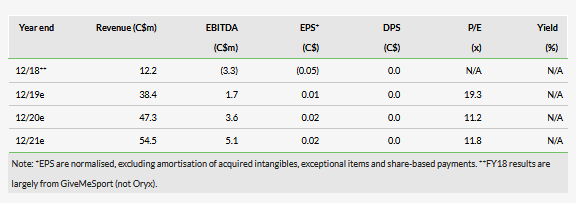
Buy and build strategy with an experienced team
Bragg Gaming is an online gaming technology holding company, formerly known as Breaking Data Corp. The business was fully rebranded with new management in December 2018, after the C$51m acquisition of Oryx, a high-growth, predominantly European online B2B gaming solution provider. Bragg’s strategy is to expand its B2B gaming business, both organically and through complementary acquisitions, as well as through strategic partnerships. At H119, management announced a strategic review of its online sports media outlet, the sale of which could provide meaningful upside to our cash forecast.
Strong pipeline to drive EBITDA expansion
Bragg’s continuing operations are now fully derived from Oryx, which grew at 240% in FY18 and 48% in H119. Oryx has an encouraging pipeline of new customers and, with c 80% of revenues derived from content aggregation, we forecast 31% revenue growth in FY19 and 23% in FY20. For FY19, we estimate 15.2% EBITDA for the Oryx business, leading to a group margin of 4.3%. Including the C$32.6m of contingent cash consideration (due in H120 and H121), net debt was C$32.7m at H119. Our estimates assume that the consideration will be satisfied equally via equity and debt and our adjusted net debt forecast declines to C$24.2m at FY20.
Valuation: Early-stage business delivering growth
Bragg Gaming has a limited reporting history and has yet to generate net profit or positive net cash. The group trades at 15.3x EV/EBITDA and 11.2x P/E for FY20e, which compares to Oryx’s purchase price of 7.8x EBITDA for FY20e. Investment risk is high, due to the need for financing (both for the earnouts and for M&A), but the group’s structure is simplifying and Bragg is strategically well positioned to make accretive acquisitions. Our core DCF valuation is C$0.36/share.
Oryx delivering double-digit growth
Rebranded as Bragg Gaming in December 2018
Bragg Gaming is an online gaming technology holding company, formerly known as Breaking Data Corporation. The business was fully rebranded with new management in December 2018, after the C$51.6m acquisition of Oryx Gaming, a mainly European online B2B gaming solution provider.
Oryx Gaming was founded in 2012 in Slovenia. Its B2B offering includes a gaming platform, content aggregation (games from numerous supplier), as well as a full turnkey offering for purely marketing-led operators. Its customer list is very impressive (eg JPJ Group, Betsson, Mr Green) and Bragg’s strategy is to expand Oryx’s B2B business both organically and through the acquisition of complementary companies. Oryx’s main market is Germany (c 50% of revenues) and future growth markets include Spain (a top European regulated market), Colombia (newly regulated) and the US (newly regulated).
Following the decision to divest the legacy online sports media outlet, Oryx is now the only core asset within Bragg’s continuing portfolio. We discuss Breaking Data’s other legacy assets on page 8, which are EBITDA loss-making; these have been significantly restructured by new management and are now classified as for sale.
Bragg is listed in Toronto (formerly Breaking Data) and it has c 170 employees, mainly in Toronto (HQ), London, Malta and Slovenia.
Investment considerations and sensitivities
Valuation: C$0.36 DCF valuation for current business
Bragg trades at 15.3x FY20e EV/EBITDA and 11.2x P/E, which is at the top end of the peer group for EV/EBITDA and in line for P/E. In terms of the sector, it is important to note that Bragg’s forecast growth rates are far higher than almost all the peers (which are generally displaying single-digit growth). We believe the closest peer is Kambi (online B2B sportsbook), which is also at the top end of the peer group, particularly for P/E (trading at 11.0x EV/EBITDA and 24.8x P/E for FY20). See page 13 for the peer group table.
Given the growth prospects, a DCF valuation can be more instructive and our core DCF valuation of C$0.36 suggests a c 29% upside to the current share price. Please see the valuation section for our key assumptions, which includes a WACC of 9%.
It is important to note that our forecasts do not include any upside from accretive acquisitions, or from the sale of GiveMeSport, but we assume that Bragg is successful in raising finance for the key earnout obligations.
In our view, key catalysts for share price performance will be continued high growth from the core Oryx business, combined with expanding EBITDA margin, as well as the successful payment of the remaining £32.6m contingent consideration for Oryx Gaming (due in H120 and H121).
Financials: Double-digit growth; but high net debt
Bragg’s continuing operations are now fully derived from Oryx, which grew at 240% in FY18 and 48% in H119. The business is gaining traction across its core markets, with a strong pipeline of new operators and c 80% of revenues from content aggregation. We forecast 31% revenue growth (pro forma from Oryx) in FY19 and 23% in FY20, with Oryx EBITDA margins of 15.2% in both FY19 and FY20. With high corporate costs (relative to the single continuing asset in the portfolio), group EBITDA was break-even at H119 and we forecast a margin of 4.3% in FY19 and 7.6% in FY20. This compares to the forecast Oryx standalone EBITDA margin of 15.2% for both years.
Including the C$32.6m of contingent cash consideration, adjusted net debt was C$32.7m at H119. In our forecasts, this figure declines considerably going forward, as we estimate that the consideration will be satisfied equally via equity and debt. Our adjusted net debt goes to C$24.2m at FY20 and C$14.1m at FY21; at the same time, interest payments would increase significantly due to the debt financing (see Exhibit 1 below).
At the current share price, we are assuming that a further 60m shares will be issued in total, which equates to a 77% dilution by 2021 (although management would like to avoid this level of dilution). Clearly, any cash inflow from the sale of GiveMeSport would reduce the level of capital raising required.
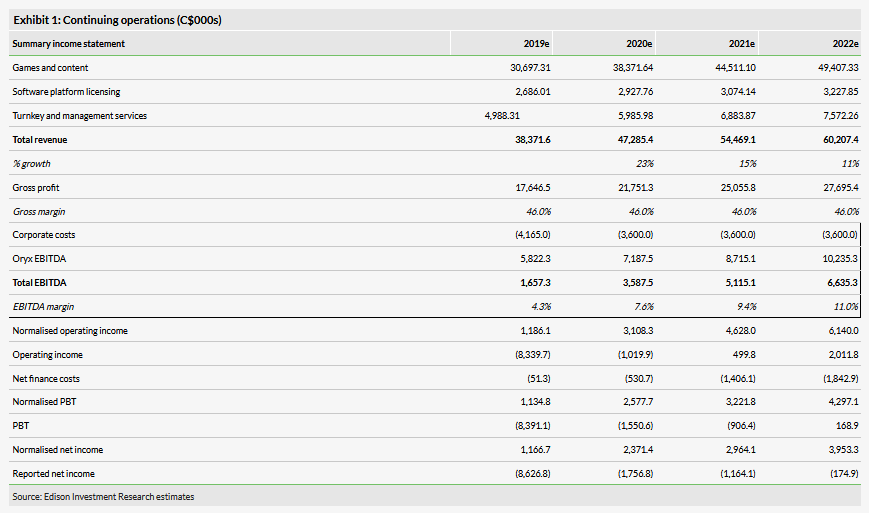
Focusing on online B2B gaming
Portfolio overview
Bragg Gaming is an online gaming technology holding company, previously known as Breaking Data Corporation. The business was fully rebranded in December 2018, after the acquisition of Oryx Gaming, a mainly European gaming solution provider.
Following the decision to divest the legacy online sports media outlet, Oryx is now the core asset within Bragg’s continuing portfolio:
Strategy: Organic growth and selective M&A
Bragg’s strategy is to expand both organically and through the acquisition of businesses that are complementary to Oryx’s B2B online gaming platform This could include the acquisition of competitors with a different geographic spread and/or another aggregator, to boost volumes and increase the number of suppliers.
Oryx’s customer base operates throughout Europe and approximately half of Oryx’s revenues are derived from German-facing operators. Revenue growth outside Germany was 87% in H119 and management has stated that key new markets include Spain (large regulated market) and Colombia (nascent but high growth potential). Looking ahead, the most important market for future expansion is the US, which has recently been regulating gaming across many states.
Oryx Gaming
History and development
Oryx is a B2B gaming solution provider, founded in 2012 by Matevz Mazij (currently MD of Oryx within Bragg). It is incorporated in the state of Delaware and its headquarters are in Las Vegas. Its primary operations are provided through its wholly owned subsidiaries in Malta and Slovenia.
The company signed its first major customer in 2013 and launched OnlineCasino.de. In 2015 Oryx obtained a Class 4 Malta Gaming Authority licence, which allowed the business to host and manage remote gaming operators. It also began to diversify its product portfolio offerings with Crown City and the Jockey Club launches in Paraguay.
In 2016 Oryx launched a real money gaming (RMG) and free play solution in New Jersey for Rush Street Interactive, and launched an online and mobile sportsbook for BigBetWorld.com. By 2018, the recurring customer base had grown to more than 60 operators, including Cherry Group, Mr Green, and JPJ Group. In H119, Oryx launched a record number of new operators, signing 22 agreements and building a strong pipeline of 24 additional operators to be onboarded in H219. Agreements have also been signed with operators such as StakeLogic, Red Tiger, Casumo and Betsson. Once signed, customers are typically on rolling contracts, hence a high recurring revenue stream.
Since inception, Oryx has focused on diversifying its customer base, with the top five customers comprising c 50% of revenues currently, which compares to 75% of revenues from just two customers at the beginning of 2018.
Products and revenues
With its industry-leading technology, Oryx offers a turnkey solution, including an omni-channel retail, online and mobile gaming platform, as well as an advanced content aggregator, sportsbook, lottery, marketing and operational services.
Oryx’s revenue grew 240% in FY18 to C$29.2m vs C$8.6m in the prior year. The company has continued its high growth into H119, with revenues increasing 48.4% to C$18.0m vs the prior period. Within this figure, revenues from German facing operators increased by 29.6%, with other revenues increasing by 86.5%. The slower growth in Germany (particularly in Q219) was largely due to the uncertain regulatory environment, whereby operators temporarily cut back on marketing spend until their licences were renewed in July 2019.
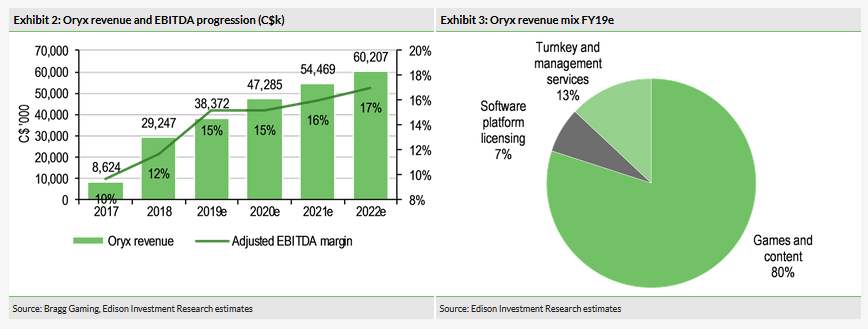
Oryx’s revenues are derived from:
Discontinued operations: GiveMeSport and GiveMeBet
In order to focus on the B2B gaming opportunity, Bragg Gaming has announced that its sport media and UK sportsbook businesses are under strategic review, for a possible sale. Management has stated that it has received expressions of interest from a number of groups regarding potential transactions with GiveMeSport and GiveMeBet and, as a result, these divisions have been classified as discontinued. Of the two assets, GiveMeSport is by far the most significant.
GiveMeSport is a sports media outlet sharing exclusive player and manager interviews, and it provides fans with up-to-date features, match previews and match reviews. The outlet shares breaking UK and European sports news, results, fixtures and statistics, as well as photos and videos on trending sports topics. It is currently the number one Facebook (NASDAQ:FB) sport publisher, with 26.1 million Facebook fans, compared to 19.4 million at ESPN and 11.7 million at Sky Sports.
GiveMeSport was a core part of the Breaking Data portfolio, but since 2018, Bragg’s new management has adopted a content first strategy, resulting in a significant reduction in output (from 100 articles a day to 25) but an increase in quality, engagement and average views per article. The web platform has recently been relaunched and engagement increased significantly in H119, with a reach of 232 million unique Facebook (NASDAQ:FB) users.
GiveMeSport’s video output has increased to 10 videos per day and it has diversified from 100% dependence on Facebook (NASDAQ:FB) and opened up revenue streams from Twitter, Apple (NASDAQ:AAPL) News, AMP and other social platforms. It has also launched ‘GMSW’, a female sport vertical that aims to be the world’s leading women’s sport content provider.
As part of the discontinued assets, GiveMeBet is a UK-focused sportsbook with direct access to GiveMeSport’s 26 million fans.
Key financials
H119 revenues from discontinued operations was C$2.2m (vs C$6.8m in H118), with an EBITDA loss of C$1.4m. To give a historical perspective, FY18 and FY17 revenues were C$12.2m and C$10.7m, with corresponding adjusted EBITDA losses of C$3.3m and C$4.4m. On the balance sheet, these assets have a negative book value of C$0.7m.
Bragg has appointed Sequence Advisers for the strategic review, but given the early stage of the process, our forecasts do not include any cash inflow from a potential sale and therefore there is a meaningful cash upside possibility should a deal occur.
Bragg Gaming and Breaking Data history
As discussed above, Bragg Gaming was formerly known as Breaking Data Corporation. The business was fully rebranded in December 2018, after the acquisition of Oryx Gaming. In this section, we review the history of Breaking Data, as well as the acquisition terms of Oryx Gaming, which is now at the core of Bragg Gaming.
Breaking Data Corporation history
In April 2017, Breaking Data Corporation was formed after a C$27.5m equity financed reverse takeover of Sports New Media Holdings Limited. The resulting business was a technology provider of a range of artificial intelligence (AI) services including semantic search, machine learning and natural language processing. Breaking Data’s main application was GiveMeSport, which utilised AI, semantic machine learning and NLP to track social media in a fully automated, real-time manner for significant sports information and events and distribute summarised information through real-time push notifications to consumers.
In December 2018, a new management team was appointed (including current CEO Dominic Mansour), who subsequently implemented a change in strategic focus for Breaking Data. Alongside the transaction to acquire Oryx (announced in August 2018), the new team refocused its strategic plans away from Al, towards the Oryx gaming platform. Changes to the Breaking Data assets included a C$8.2m impairment of goodwill (August 2018) and a C$2.4m impairment in the value of Breaking Data’s intellectual property (December 2018).
As discussed above, after the decision to place the legacy sports businesses under strategic review, both GiveMeSport and GiveMeBet are now classified as held for sale.
Acquisition of Oryx: 7.8x EV/EBITDA for FY20e
The Oryx acquisition was completed on 20 December 2018. At the time of the acquisition, the total estimated purchase price was C$51.6m, including C$15.1m in shares and C$6.4m in cash, C$3.0m in deferred consideration and C$27.1m in contingent consideration. The deal included C$31.9m of goodwill. As detailed in Exhibit 4 below, at H119 results, management revised the original purchase price down by C$0.722m due to changes in working capital.
Subsequently (ie not included in Exhibit 4) the deferred consideration has been lowered by C$0.65m, as a result of a lower share price, which affects the value of 2m shares to be issued. However, contingent consideration has been raised by C$5.53m, since there is now greater certainty regarding the FY19 Oryx EBITDA. The total revised purchase price equates to C$55.7m or 7.8x EV/EBITDA for FY20e, which is in line with other recent deals (see Gamesys/JPJ and Rank/Stride Gaming).
Earnout provision
The C$32.6m contingent consideration (revised upwards from the original C$27m) relates to the earnout provision to the vendor of Oryx. This will be mostly satisfied in cash, but also includes C$5m of Bragg equity. Management confirms that the entire Oryx acquisition payment was capped at €50m: €7.5m has been paid already and therefore the cap on the earnout is €42.5m. We note that the vendor has no lock up post the earnout payment. We summarise the terms of this contingent consideration here:
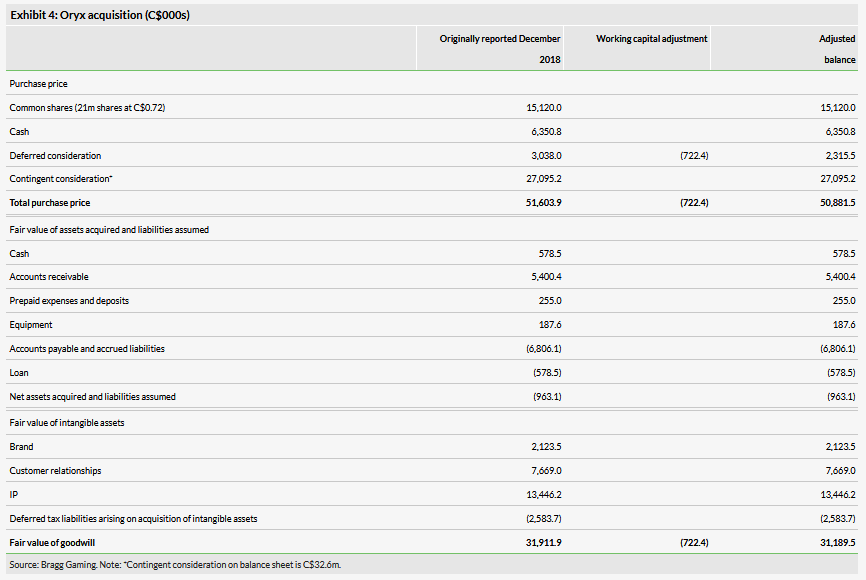
Online gaming markets
Online gaming overview
According to H2GC, the global online gaming market has grown at a c 10% CAGR over the past 10 years and amounted to c £40bn gross gaming revenues (GGR) in 2018. Driven largely by the opening of the US market, H2GC estimates online growth of 7% CAGR to 2023.
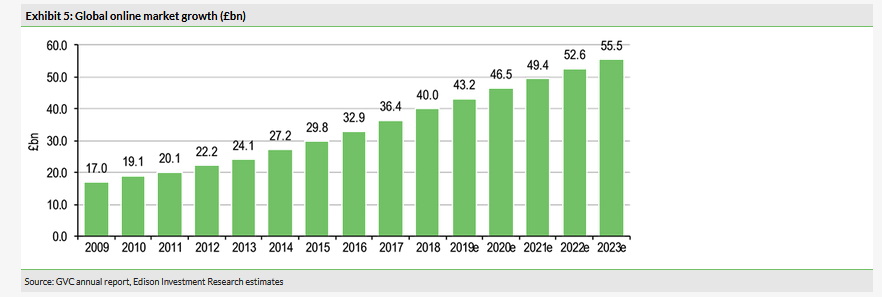
The shift towards online gaming over the past decade has been driven by a number of different factors. In addition to rising mobile penetration and product innovations, the most important contributor has been the introduction of local regulation across a growing number of countries.
Regulation varies significantly across the world: from markets where gambling is explicitly prohibited, to government-owned monopolies, to licensed industries that are fully open to commercial operators. There are also many countries where governments are yet to legislate for online products and the regulatory picture in these markets remains grey.
Oryx Gaming currently has licences to operate across all its markets, although regulation in some markets remains unclear. This is particularly the case in Germany, which we estimate comprises approximately half of Oryx’s revenues.
Germany: Uncertainty led to temporary slowdown in Q219
At the moment, Germany is a grey market, where online gaming companies generally operate in Schleswig-Holstein (with a local licence) or through another European licence (typically Maltese) and pay VAT on casino revenues and a turnover tax on betting. To date, legislation has been very confusing and there has been a high level of disagreement among Germany’s member states.
Sports: regulation in sight
In March 2019, German state ministers approved an interim sports-betting licensing regime from January 2020 (not directly relevant to Oryx, which focuses on online casino). The amendments also lifted the cap on licences in preparation for a future agreement on a more permanent regime from June 2021.
E-gaming: Federal ban except in Schleswig-Holstein
The biggest area of confusion surrounds the issue of online gaming (which is Oryx’s key focus), with online casino and poker technically illegal under the current reading of the Interstate Treaty. In March 2019, the draft amendments maintained a federal ban on online casino set in 2012, with the exception of Schleswig-Holstein, where online casino licences already granted continue for the interim period. Oryx Gaming holds one of these Schleswig-Holstein licences, which were recently renewed (July 2019). Oryx’s iGaming platform is compliant with the Schleswig-Holstein technical regulations and Oryx’s content portfolio has been approved by the regulator. Oryx’s key customers all hold compliant casino licences.
Within Schleswig-Holstein, there is an important distinction between the casino-only operators (like Oryx) and the sports-led operators (who cross-sell into casino from their sports brands). The operators with both online sports betting licences and online casino licences issued by Schleswig-Holstein are particularly exposed, with regulators requiring sports betting licensees to stop offering casino games alongside sports betting. Oryx’s key Germany-facing customers have Schleswig-Holstein casino licences only and are therefore less exposed to this likely change in regulation. Bragg’s management has stated that its customers are perceiving this as a significant opportunity to gain market share.
Germany summary
To summarise, the most likely scenario for German regulation is that there will be full online sports regulation from mid-2021 and partial e-gaming regulation (on a state-by-state basis).
At present, the regulatory framework for online gaming outside Schleswig-Holstein remains uncertain. In terms of Bragg’s exposure, Bragg's Germany-facing customers are primarily operating online e-gaming under Schleswig-Holstein casino licences.
US: The most important growth market for online gaming
The US is a promising potential market for Bragg, as a B2B online player. After the repealing of the Professional and Amateur Sports Protection Act (PASPA) in 2018, the US is now positioned as the most important regulating market, in terms of future growth prospects. Industry estimates are that the US online market could generate c US$6bn in the medium term, from a base of c US$600m at FY18.
The US regulatory environment is changing rapidly, with many new states having recently announced regulatory packages. In addition to online sports, many of the states are also incorporating e-gaming (casino) into the regulation. In the near term we would expect that Bragg could partner with other sportsbook operators, with its complementary casino platform and/or its player account management tools for the sportsbook. At present, we have not included significant upside from the US into our forecasts, as Bragg has yet to partner with any US facing operators.
Management
Bragg’s current executive team and board were appointed in 2018, to restructure the legacy Breaking Data assets, as well as to lead the integration of the Oryx business. All members have extensive experience in the online gaming sector, including CEO Dominic Mansour, whose background includes 20 years working in the industry. We detail the biographies of the key members in Exhibit 6 below.
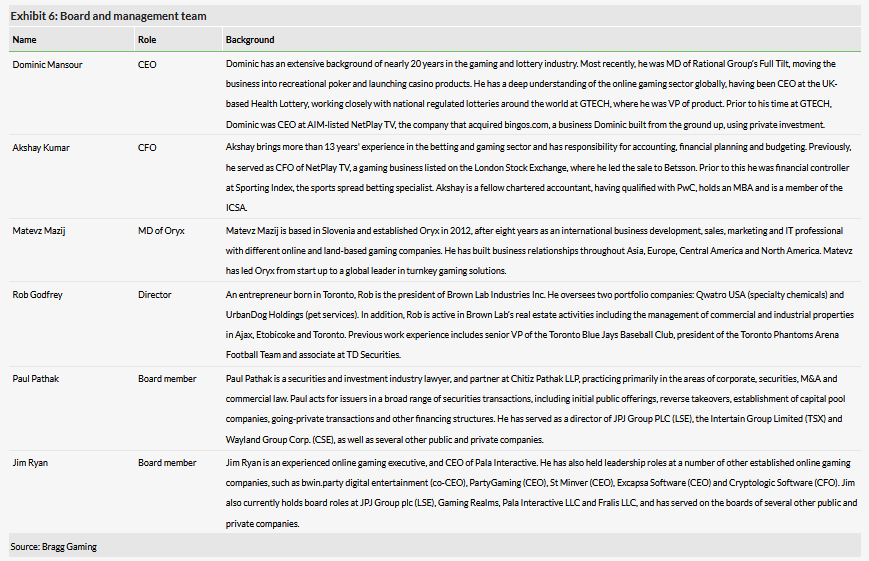
Bragg has a fixed stock option plan, as well as a deferred share unit plan in place. At H119, there were 9.6m outstanding stock options, and the vast majority have exercise prices well above the current share price. Additionally, there are 27.1m special warrants in place; please see the financials section for more details.
Sensitivities
Valuation
Peer group valuation: Top end of peers, but with higher growth prospects
The most straightforward way to value Bragg Gaming is via a peer group comparison, based on future profits, although it is important to note that Bragg’s growth rates are far higher than almost all the peers (which are generally displaying single-digit growth).
Given the debt profile, we believe that EV/EBITDA is the more appropriate benchmark and using an adjusted net debt of C$32.7m, Bragg trades at 15.3x and 10.7x EV/EBITDA for FY20 and FY21, which is 71% and 34% above the peer average. For P/E, it trades at 11.2x and 11.8x for FY20 and FY21, which is more in line with the peers. For our EPS calculation, we have assumed that C$16.3m worth of shares are issued to satisfy the contingent consideration, which leads to a total equity dilution of 77% (including 2m shares from the deferred consideration).
In terms of operations and growth prospects, we believe Kambi is the closest peer (B2B online sportsbook) and Kambi also trades at a significant premium to the sector average.
Peer group analysis
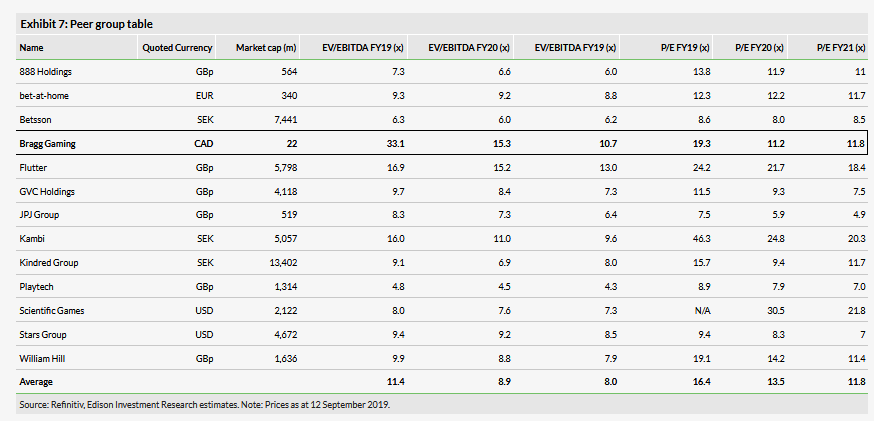
DCF: C$0.36/share valuation
Given the growth prospects, a DCF valuation can be more instructive and our core DCF valuation of C$0.36/share suggests 29% upside to the current share price. Our DCF uses a terminal growth rate of 2.0% and a terminal EBITDA margin of 11%, in line with our forecast FY22e EBITDA margin. This is at the lower end of the peer group, but includes the higher than average corporate costs. Using a WACC of 9.0% produces a value per share of C$0.36/share; flexing the WACC between 8.0% and 10.0% gives a range of C$0.24–0.53/share. Our core DCF valuation equates to 17.0x EV/EBITDA and 14.5x P/E for FY20e.
It is important to note that our forecasts do not include any upside from accretive acquisitions, or from the sale of GiveMeSport, but we assume that Bragg is successful in raising finance for the key earnout obligations.
Catalysts
In our view, key catalysts for share price performance will be continued high growth from the core Oryx business, combined with expanding EBITDA margins, as well as the successful payment of the remaining £32.6m contingent consideration for Oryx Gaming (due in H120 and H121).
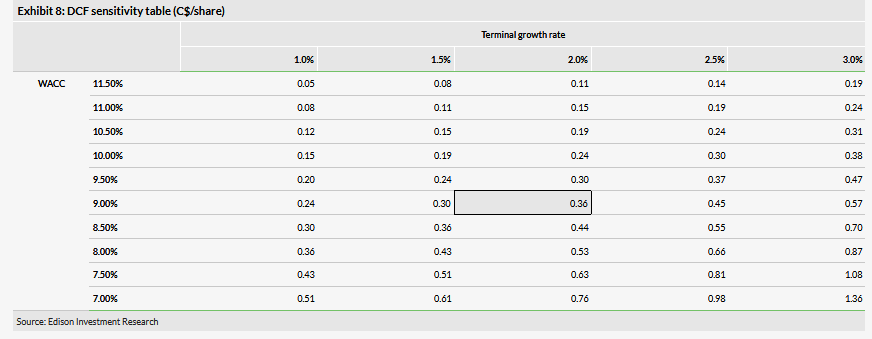
Financials
Bragg Gaming has a limited reporting history, having reported its first half year at H119. In our financial summary, we have included financials for FY18, although this comprises the legacy Breaking Data operation and only includes 10 days of Oryx’s trading (it was acquired on 20 December 2018).
Income statement: High revenue growth, EBITDA break-even
Bragg’s continuing operations are now fully derived from Oryx and the company reported Q219 continuing revenues of C$8.8m, an EBITDA loss of C$0.3m. For the first half, this amounted to 48% revenue growth to C$18.0m vs the prior year and positive EBITDA of C$0.4m.
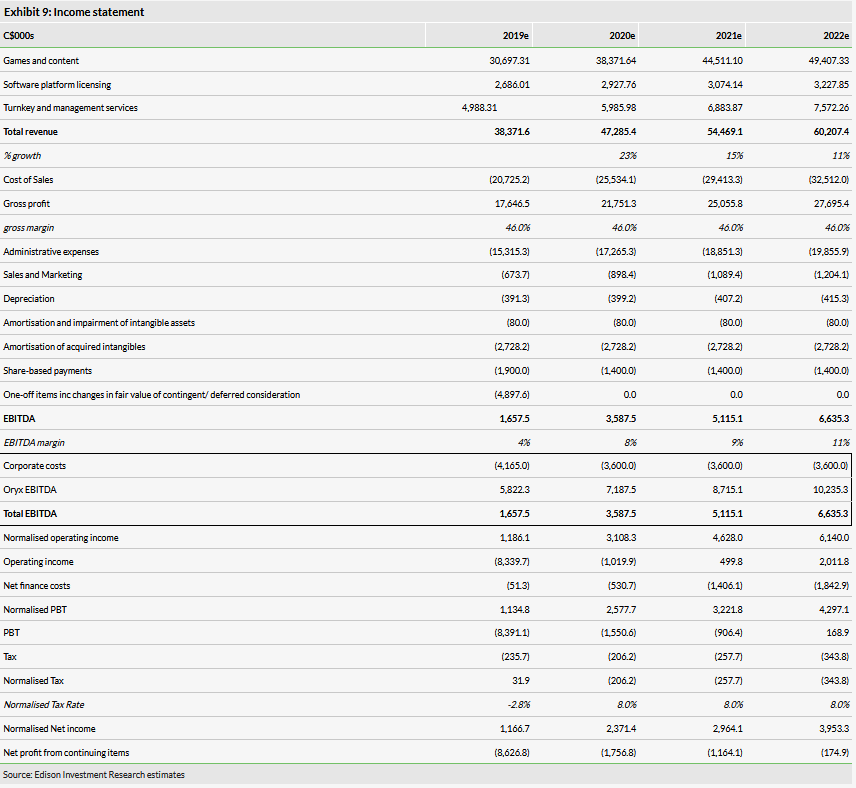
Future potential equity dilution
Bragg currently has 78m shares in issue. This includes an issuance of 27.1m shares in March 2019 (see below). In addition, there are a further 9.6m outstanding share options, 27.1m warrants and 1.6m compensation options. Furthermore, within current liabilities, C$0.8m of deferred consideration is to be satisfied by shares (equivalent to 2m shares); this is included in our adjusted net debt for FY19 but within our EPS calculation from FY20 onwards.
As is common with start-up businesses, many of the executives are rewarded with stock options and equity has also been used as part payment for the Oryx acquisition. While most of the options and warrants have exercise prices that are significantly above the current stock price, it is important to note the potential for future equity dilution. We summarise the options and warrants here:
Balance sheet and cash flow statement
With high growth at Oryx, we forecast positive operating cash flow in FY20. However, this will still be insufficient to meet earnout obligations. Oryx ended H119 with net cash of C$0.8m, excluding earnout obligations, but including leases payable (IFRS 16 changes). Including the deferred consideration and contingent consideration, adjusted net debt was C$32.7m.
